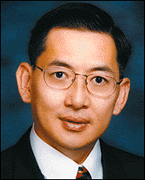

![]()
Pacific Perspective


![]()
Pacific Perspective
THE trade dispute between China and Japan on import tariffs has now lingered for four months. Despite a softened tone in diplomatic language from both sides, no one can predict when the tangle will end. China-Japan trade
dispute signals new
era in commerceNegotiations are a healthy undertaking of free trade and should be considered routine events.
But the decision last April by the Japanese government to impose high duties on imports of Chinese-grown shiitake mushrooms, spring onions and a plant used to make tatami mats is no routine event.
For one thing, this is the first time since the early 1970s that Japanese authorities have imposed import limitations.
For another, Japanese politicians have apparently fallen into the classic temptation of linking international trade policies with sensitive domestic economic agendas -- in this particular case, these restrictions were a show of assistance to local farmers in an electoral season.
Perhaps most interestingly, Japan is probing protectionism in an era of global trade with one of its most important trade partners and neighbors -- China.
As expected in any trade dispute, China has retaliated.
Tit-for-tat, it has doubled the import tariffs on certain popular Japanese cars, mobile phones and air conditioners.
That radical settling of scores has generated anxiety from the business community in Japan, which is requesting that the two governments solve the dispute according to free trade principles.
Indeed, if the trade dispute escalates, Japan is running the risk of losing more money than its Chinese counterpart.
Here is a likely scenario: Japan could attack China's textile industry. China could attack the Japanese high-tech industry.
A loss in high-tech exports should be more painful than a loss in textile production.
So far, the impacts of the tariff confrontation represent only a fraction of Sino-Japanese trade, which has an estimated volume of $83 billion.
But, regardless of the final outcome of the conflict, there are at least two observations one can take from the dispute.
The arguments over trade underline the importance of an international trade body such as the World Trade Organization. Until China joins WTO -- a move expected to happen before the end of this year -- both antagonists use the lack of a mutually agreeable and accepted arbitration mechanism as an excuse to justify their tariff decisions.
But probably the most intriguing revelation from the dispute is that Japan -- implicitly with its unprecedented "emergency" import restrictions -- has signaled a new commerce era, one in which China has become a redoubtable competitor capable of altering the existing landscape of global trade.
If it has not already done so, the United States should adopt its trade policy and strategy accordingly.